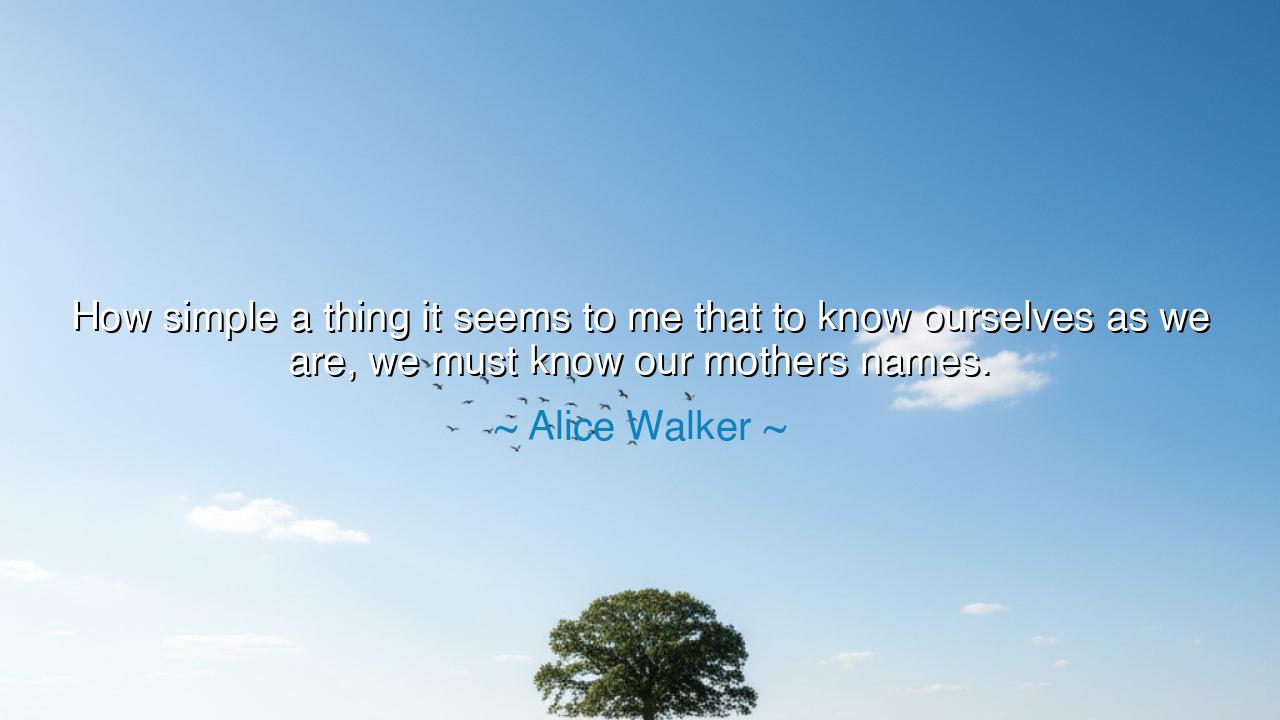
How simple a thing it seems to me that to know ourselves as we
How simple a thing it seems to me that to know ourselves as we are, we must know our mothers names.






The words of Alice Walker — “How simple a thing it seems to me that to know ourselves as we are, we must know our mothers’ names.” — carry the quiet yet profound weight of ancestry, identity, and memory. In this reflection lies an eternal truth: that to understand the self, one must trace the roots from which it springs. Names are not merely labels; they are vessels of history, culture, and legacy. To know one’s mother’s name is to acknowledge the life, struggles, and essence that formed us, to recognize the lineage that pulses through our veins, shaping character, resilience, and purpose.
Walker’s statement emphasizes the intimacy of knowledge and connection. The ancients understood that personal identity cannot exist in isolation. In the genealogies of Greek and Roman families, names were passed down to preserve memory and honor ancestors. Knowing one’s mother was not only a social fact but a moral and spiritual act: it situated the individual within a continuum of life, reminding them of the sacrifices, virtues, and lessons carried forward by previous generations. Walker elevates this principle to a universal reflection: self-knowledge is incomplete without reverence for those who gave us life.
To know our mothers’ names is also to confront the truth of our origin. Every mother carries within her experiences that shape the very being of her children. Her name is a symbol of her struggles, her joys, her victories, and her endurance. To ignore this is to sever the thread connecting present to past, self to lineage. Walker’s insight resonates with the African tradition of remembering ancestors, where to speak the names of one’s mothers and grandmothers is to summon their guidance and honor their wisdom. In doing so, one becomes fully aware of the inheritance of strength, culture, and identity they embody.
Consider the life of Sojourner Truth, whose courage and voice were rooted in the memory of her mother, Elizabeth Baumfree. Truth carried forward not only her own experiences of enslavement but the resilience and fortitude of her mother, who had endured the same oppression in silence. By knowing her mother’s name and honoring her story, Truth was able to claim her own identity and amplify it into a legacy of social justice. Alice Walker’s reflection mirrors this: understanding one’s self requires embracing the maternal lineage, for it is from this wellspring that personal identity is nourished.
Walker’s statement also underscores the ethical responsibility inherent in memory. Knowing a mother’s name is not a passive act; it is a deliberate acknowledgment of their humanity, their struggles, and their existence. It is an act of gratitude and reverence, recognizing that the self is inseparable from the sacrifices that preceded it. In ancient societies, women who bore and nurtured children were revered precisely because their names and stories preserved the continuity of family, tribe, and culture. Walker reminds us that such acknowledgment remains vital: it roots identity in reality and cultivates moral integrity.
The simplicity of her observation — “How simple a thing it seems” — belies its profound depth. So often, we seek self-knowledge in philosophy, literature, or introspection, yet Walker suggests the most foundational truth lies in remembering and honoring one’s mother. Her name is a bridge: between past and present, self and lineage, memory and identity. To know this name is to know the struggles, triumphs, and essence that reside within us, for our lives are inseparable from theirs.
From this reflection emerges a lesson for all generations: seek the roots of your existence to understand yourself fully. Honor your mother, her name, her life, and the legacy she has passed. In doing so, you reclaim not only your history but the wisdom and resilience encoded within it. The act of remembering becomes both a moral and existential foundation, offering clarity, strength, and grounding in an ever-changing world.
Thus, Alice Walker’s words endure as a beacon of ancestral wisdom: to know ourselves, we must honor those from whom we spring. By speaking, remembering, and venerating our mothers’ names, we weave our personal identity into the vast tapestry of human continuity. In their names, we find guidance, strength, and the profound understanding that who we are cannot exist without the lives and stories of those who came before.






AAdministratorAdministrator
Welcome, honored guests. Please leave a comment, we will respond soon